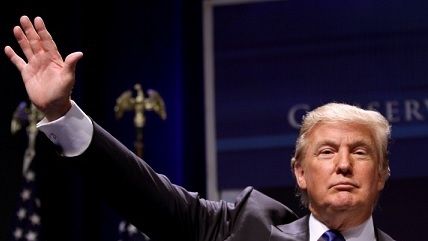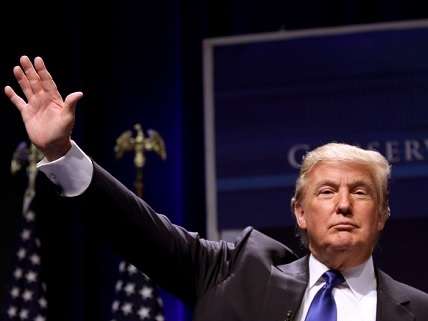China Points to Donald Trump as an Example of Democracy
But he'd be a better fit for an autocracy


The Global Times, a state-owned tabloid newspaper in China, published an op-ed today calling Donald Trump a "pandora's box" for the United States and insinuating Trump's rise was illustrative of the problem with adopting democracy.
"Fist fights among voters who have different political orientations is quite common in developing countries during election seasons," the op-ed reads. "Now, a similar show is shockingly staged in the US, which boasts one of the most developed and mature democratic election systems."
The Global Times' political analysis of Trump is relatively simplistic—but much of the domestic analysis has been too. "Trump's rise was not anticipated by most analysts and observers," The Times declares, explaining to readers he was "the last option for the GOP establishment," who can either compromise their values and accept Trump if he wins, or reject him as the nominee which, The Times speculates, could lead him to making an independent run.
The Times identified Trump's supporters as "mostly lower-class whites" who "lost a lot after the 2008 financial crisis," attributing that crisis and a perceived decline in the U.S. middle class as the catalyst for Trump.
"Big-mouthed, anti-traditional, abusively forthright, he is a perfect populist that could easily provoke the public," The Times declares. "Despite candidates' promises, Americans know elections cannot really change their lives. Then, why not support Trump and vent their spleen?"
Marxist philosopher Slavoj Zizek made a similar point in Newsweek last month while discussing Trump's "vulgarity."
"Whatever Trump is," Zizek wrote, calling him relatively moderate, "he is not a dangerous outsider… The function of his 'refreshing' provocations and vulgar outbursts is precisely to mask the ordinariness of his program.
Zizek continued: "His true secret is that if, by a miracle, he wins, nothing will change." Unfortunately (but unsurprisingly) Zizek undercut his own point immediately after this by claiming Bernie Sanders, a sort of doppleganger to Trump on the left, would induce change because "he understands and respects the problems and fears of ordinary workers and farmers." It shouldn't be surprising a left-wing "thinker" like Zizek would mindlessly accept at face value what a politician he agrees with is saying.
Nevertheless, the point on Trump is largely correct. And contrary to China's op-ed assertion, Trump isn't exactly a refutation of democratic principles. After spending months insisting Trump wasn't the worst Republican candidate, Vox.com's Matthew Yglesias now claims he was just being a "contrarian" and Trump is too dangerous of a person to be allowed to win.
His argument inadvertently helps identify how the left helped bring us here too. "The framers of the Constitution rather sharply circumscribed the president's authority to make and repeal legislation," Yglesias wrote. "…But the president and his appointees have enormous discretion over the enforcement of existing laws."
The executive is supposed to be a co-equal branch of government, along with the legislative and the judicial, Obama and his supporters' demands that Congress do what he says notwithstanding. Yglesias has been right there too, endorsing the generations-long effort at building an imperial presidency.
China is right that placing Donald Trump in that kind of a role is dangerous. But so would putting Trump at the head of the Chinese government—the crucial difference being that in a democratic system the head of state is supposed to be limited constitutionally, while in a one-party authoritarian system the party alone can limit the leader's power.
Of note here is that Trump is something of a fan of China and its system. In 1990 he spoke fondly of the Chinese crackdown on and massacre of student demonstrators at Tiananmen Square, saying China was strong where the U.S. was weak. And it's not just authoritarians nominally on the right who envy China. Liberal thinkers like Thomas Friedman have praised China's autocratic model as one under which political leaders can "get things done." Their problem with Trump is his perceived ends, not the means by which he appears to be ready to pursue them.


Show Comments (201)